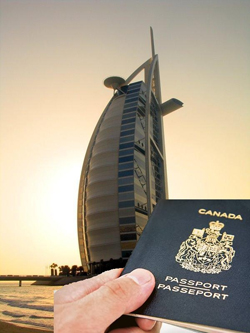 Riyadh, Oct 27: Foreign airlines based in Riyadh have advised travel agents in the Kingdom to tell their customers to carry a re-entry visa printout with their passports when they travel abroad.
Riyadh, Oct 27: Foreign airlines based in Riyadh have advised travel agents in the Kingdom to tell their customers to carry a re-entry visa printout with their passports when they travel abroad.
The announcement was made following complaints by expatriate workers returning to the Kingdom after the Eid holidays who were denied boarding by airline officials for not having re-entry visa information on their passports.
Officials of foreign airlines said Saturday that they have already advised their agents to inform travelers about the new requirements expected from passengers at the embarkation points.
In September, the Passport Department began issuing multiple entry visas to the Kingdom with an official stamp on the passport. However, many airline officials have demanded visa printouts or other forms of authentication to certify that passengers are in possession of valid visas to enter the Kingdom.
A printout can be obtained only when a single entry visa is issued electronically, but multiple entry visas are issued at the Passport Department. The visa is recorded in the system and an official stamp is placed with only the visa number.
Ruwan Wijekone, Sri Lankan Airlines manager for the central province, said the airline has advised agents in the Kingdom that passengers should carry the visa printout with them. He pointed out that if an airline allows a passenger to board without a valid visa, it has to incur unwanted expenditures such as return fare for the passenger, fine and allied expenses for his stay in the Kingdom till he is deported home.
“We are only taking a precautionary measure, which is carried out in the interests of the passenger as well as the airline,” he said, adding that checking the veracity of the visa online is impossible when the airline has to check in over 300 passengers of a Saudi Arabia-bound flight.
Speaking to Arab News, Sri Lankan Ambassador Vadivel Kirshnamoorthy said that he would advise the Sri Lankan Bureau of Foreign Employment (SLBFE) to make arrangements to help people who come to the airport without the entry visa printout. He said the SLBFE, which has a special help desk at the airport for incoming and outgoing workers, could handle this matter smoothly.
Currently, officials at the Sri Lanka Bureau of Foreign Employment (SLBFE) do not have a system to track the Saudi entry visas of workers who leave the country. All Lankan foreign workers are expected to register with the SLBFE on a nominal registration fee for which a wide range of services are offered to its foreign workers.
Speaking from Colombo, an official of the Saudi Arabian Airlines said that it has deployed a special officer at the Colombo International Airport to assist such cases. The officer concerned goes online to check the visa status and acts accordingly.
“We also have an Arabic translator at our ticketing office to check the visa status of passengers,” he added.
Mohammed, a passenger who came from Dubai said the Saudi Arabian Airlines officials at Dubai airport were kind enough to check his visa status through the MOI online service and allowed him to board the flight although he did not have a visa slip.
To find out the visa status in the official website of the Ministry of Interior, one must either have the visa number or the sponsor's number.





Comments
need re Entry Visa
in the saudia Arabia
Add new comment